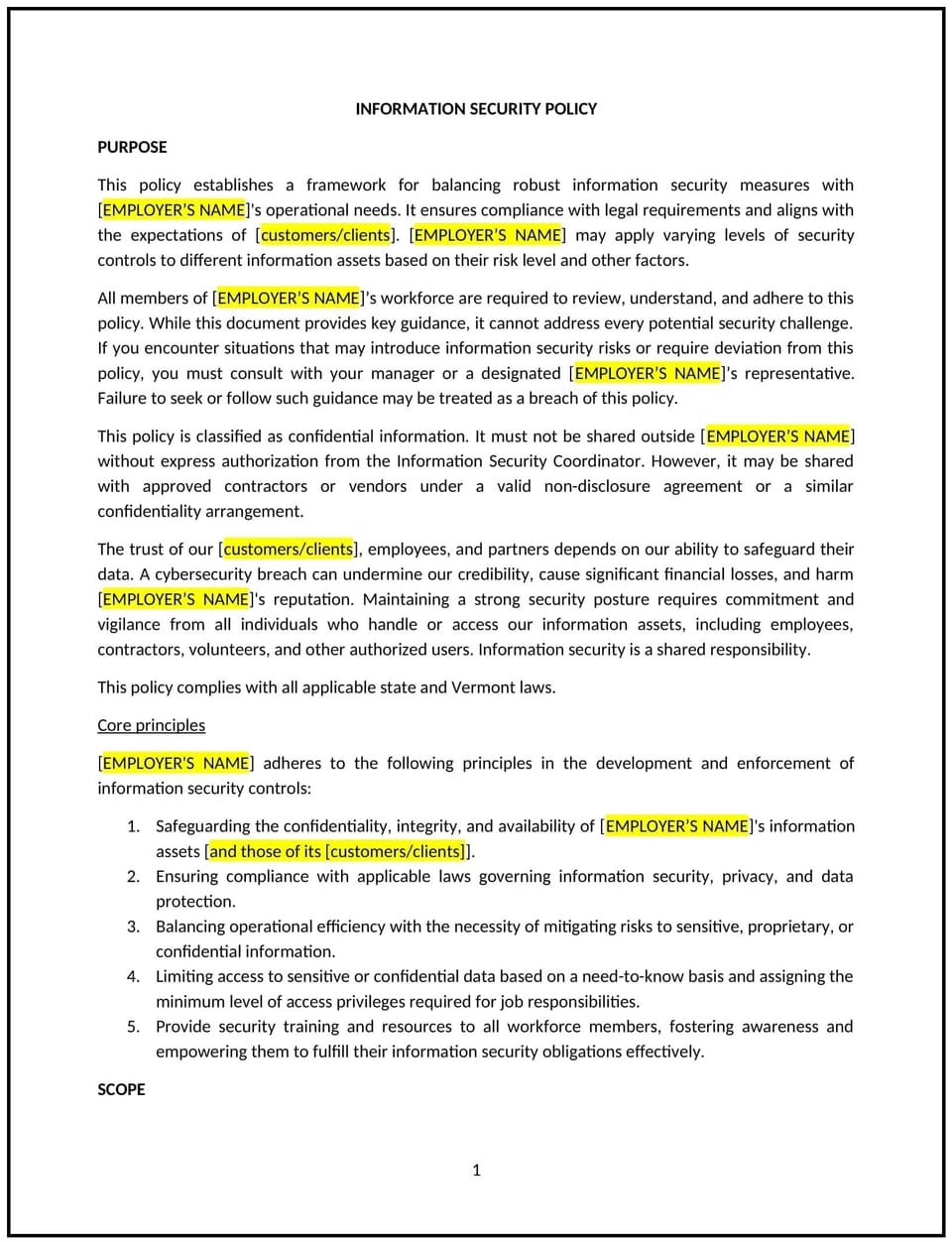Information security policy (Vermont): Free template

Information security policy (Vermont)
This information security policy is designed to help Vermont businesses protect sensitive data, prevent unauthorized access, and strengthen compliance with Vermont and federal data protection laws. It establishes guidelines for securing information systems, managing risks, and responding to potential breaches.
By adopting this policy, businesses can safeguard data integrity, build trust, and minimize security risks.
How to use this information security policy (Vermont)
- Define sensitive information: Identify the types of data covered by the policy, such as customer information, financial records, or employee details.
- Establish access controls: Specify who can access sensitive information and the authorization processes required.
- Include device security: Outline requirements for securing company devices, including laptops, mobile devices, and workstations.
- Provide data handling guidelines: Detail procedures for storing, transferring, and disposing of sensitive data securely.
- Address cybersecurity measures: Include protocols for using firewalls, antivirus software, encryption, and other protective technologies.
- Specify incident response: Provide steps for responding to security breaches, including notification, containment, and recovery processes.
- Monitor compliance: Regularly review and update security practices to align with Vermont laws and evolving threats.
Benefits of using this information security policy (Vermont)
This policy provides several benefits for Vermont businesses:
- Enhances data protection: Safeguards sensitive information against unauthorized access or breaches.
- Improves compliance: Aligns with Vermont data protection regulations and federal laws, such as HIPAA or CCPA.
- Reduces risks: Mitigates potential financial, legal, or reputational damages from security incidents.
- Builds trust: Demonstrates the company’s commitment to protecting stakeholder information.
- Improves response: Establishes a structured approach for handling security incidents effectively.
Tips for using this information security policy (Vermont)
- Communicate the policy: Share the policy with employees and contractors during onboarding and include it in internal resources.
- Provide training: Offer regular training on recognizing phishing attempts, using strong passwords, and handling data securely.
- Use technology: Implement monitoring tools to detect and respond to security threats in real-time.
- Encourage reporting: Create a process for employees to report suspicious activity or potential vulnerabilities.
- Update regularly: Revise the policy to reflect changes in Vermont laws, industry standards, or emerging security threats.
Q: What types of information are covered under this policy?
A: This policy covers sensitive information such as customer data, financial records, intellectual property, and employee details.
Q: How is access to sensitive information controlled?
A: Access is restricted to authorized personnel and requires proper authentication, such as passwords, multi-factor authentication, or role-based permissions.
Q: What steps should employees take to secure their devices?
A: Employees must use strong passwords, install security updates, avoid public Wi-Fi for work purposes, and follow other security guidelines in this policy.
Q: How are security incidents handled?
A: Security incidents are managed through the company’s incident response plan, which includes containment, notification, investigation, and recovery steps.
Q: Are employees trained on information security?
A: Yes, employees receive regular training on recognizing threats, following secure data handling practices, and reporting suspicious activity.
Q: How often is this policy reviewed?
A: This policy is reviewed annually or whenever significant changes occur in Vermont laws, security standards, or organizational needs.
Q: What happens if an employee violates the policy?
A: Violations may result in disciplinary actions, including warnings, suspension, or termination, depending on the severity of the breach.
Q: Does this policy apply to remote employees?
A: Yes, remote employees are required to follow the same security protocols to ensure the protection of company data.
This article contains general legal information and does not contain legal advice. Cobrief is not a law firm or a substitute for an attorney or law firm. The law is complex and changes often. For legal advice, please ask a lawyer.


